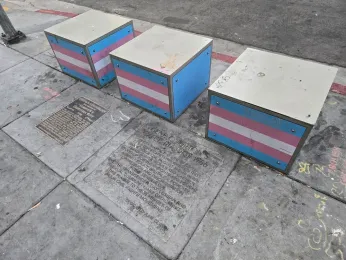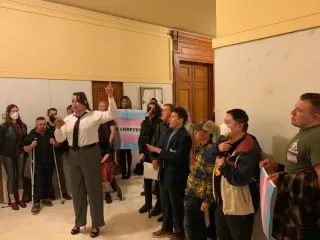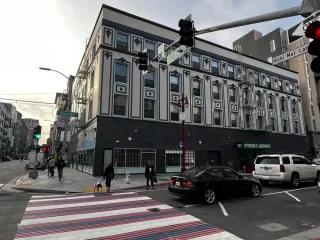
Aug 12
Activists persist on zoning determination for Compton’s site
Eliot Faine READ TIME: 3 MIN.
Activists are preparing to challenge a recent San Francisco Board of Appeals decision that upheld the continued use of the historic site of the former Gene Compton’s Cafeteria as a prison reentry facility. The activists plan to make their request at the August 20 Board of Appeals meeting.
City residents, historians, and scholars are preparing to present new evidence to the Board of Appeals in their request for a rehearing, challenging the board’s 4-1 decision in July to uphold a zoning determination for GEO Reentry Services, a subsidiary of GEO Group Inc.
Wilder Zeiser, who filed the zoning complaint, said they were surprised with the appeals board’s decision allowing GEO Group to continue operating out of the 111 Taylor Street building.
“We were surprised that we lost the hearing on July 16,” Zeiser said in an interview with the Bay Area Reporter.
For 36 years the private prison operator and federal Immigration and Customs Enforcement contractor GEO Group has been operating a reentry facility at 111 Taylor Street.
The ground floor commercial space had housed Gene Compton’s Cafeteria, where one night in August 1966 a drag queen reportedly threw a cup of hot coffee in the face of a police officer who tried to arrest her without a warrant. The exact date of the altercation has been lost to time. But the incident sparked a riot between trans and queer patrons of the 24-hour diner and cops, as detailed in the 2005 documentary "Screaming Queens" by transgender scholar and historian Susan Stryker, Ph.D. .
The property earlier this year became the first one of its kind granted federal landmark status specifically for its connection to the transgender movement in the U.S. It is also now on the California Register of Historical Resources.
In 2022, the San Francisco Board of Supervisors declared the intersection in front of Compton’s and the exterior walls of 111 Taylor Street as the city’s 307th landmark . It provides some level of protection to the building facade from being altered.
Present-day activists with Compton’s x Coalition had appealed the letter of determination from the zoning department earlier this year affirming the facility’s group housing determination on the grounds that the building should be considered a “carceral operation.” It was that determination that the appeals board upheld last month.
Since then, however, there have been new revelations.
Chief among them is the July 14 death of former 111 Taylor Street resident Melvin Bulauan. He died about a block away from the facility, and had been transferred to 111 Taylor Street the day before. News of his passing came the day after the Board of Appeals upheld the group housing determination.
“We compiled a new set of evidence and submitted that for a rehearing so there’s obviously, you know, Melvin Bulauan’s death, in addition to a couple of other points that aid in our quest for rehearing,” Zeiser said. “August 20 will be at the Board of Appeals, a brief hearing to determine whether we qualify for a full rehearing.
“I believe that we would qualify for a rehearing based on the new evidence,” Zeiser added. “But again, I’m not getting my hopes entirely up because of the surprise of losing the last hearing.”
The Compton’s x Coalition will argue in its request that Bulauan’s case and other residents’ allegations of “prison-like” conditions at 111 Taylor Street should be enough to qualify for a rehearing.
The Board of Appeals will hear Chandra Laborde's request, as well as GEO Group’s response. The meeting takes place at 5 p.m. at San Francisco City Hall. If granted the request, a rehearing of the determination appeal will be set.
If not, with administrative remedies exhausted, Compton’s x Coalition will be able to file a writ, a type of lawsuit to challenge government decisions, Zeiser stated. A writ would take the case beyond the Board of Appeals to superior court. Ultimately, if the zoning status of the facility is found inaccurate, this could lead to termination of GEO’s contract with the California Department of Corrections and Rehabilitation .
Updated, 8/13/25: This article has been updated to correct the spelling of Wilder Zeiser's surname and to indicate that Chandra Laborde filed the request for a rehearing.



